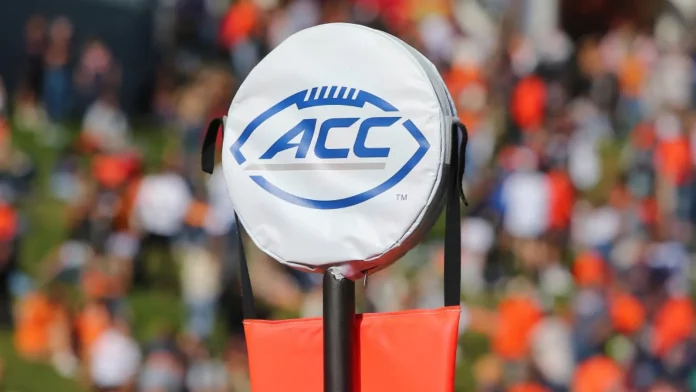
USF could replace FSU and Miami
Jim Williams, Capital News Network
Experts are discussing the potential departure of North Carolina, Clemson, Florida State, Louisville, and Miami from the ACC to another conference. Meanwhile, Commissioner Jim Phillips is using insights gained from the collapse of the Pac-12 to find ways to keep the ACC relevant, even if it loses these top four or five programs around the year 2030.
Commissioner Phillips has several plans to ensure the ACC remains strong beyond 2036, when their current agreement with ESPN expires. He has been in ongoing discussions with Notre Dame Athletic Director Pete Bevacqua about the future of the conference and Notre Dame’s desire to stay within the ACC. Additionally, Phillips is in talks with Tim Cook, a Duke board member and alumnus who is also the CEO of Apple. Their discussions focus on long-term strategies that extend beyond 2036.
MUST READS
Philips recognizes that there will be changes, and he is working diligently to ensure that the conference maintains its brand strength, even if some members decide to leave. Multiple plans are in development to ensure that the post-2030 ACC remains a Power Four conference, with sufficient brand recognition to retain schools like Boston College, Duke, Cal, Georgia Tech, North Carolina State, Virginia, Virginia Tech, Pitt, SMU, Stanford, Syracuse, and Wake Forest, all of which contribute to keeping the ACC competitive and most of all staying together.
Should Clemson, Florida State, Miami, and North Carolina decide to move to either the Big Ten or the SEC, it’s well-known that Louisville is interested in potentially joining the Big 12. This mass exodus could occur in either 2029 or 2023 when the television deals are up for renewal.
Even with reduced revenue from ESPN, the remaining ACC schools have ample resources to remain competitive until 2036. For the most part, the remaining members understand how to maximize every dollar when it comes to athletics.
The War Chest
If the five schools were to leave the conference in 2029, they would owe $93 million each, totaling $465 million. An exit in 2030 would cost $75 million per school, resulting in $375 million in exit fees for the ACC. That war chest could help keep teams happy until the ESPN deal is over in 2036.
Meanwhile, Phillips has identified six schools as potential additions to the conference and is in talks with key stakeholders to explore options for the future beyond 2036. His talks with some key members of the conference are proving to provide a roadmap to the future.
The ACC Won’t Make The Mistake The Pac 12 Did With Apple
The PAC-12 failed after over 100 years as a conference for several reasons, one of the most ironic being its inability to anticipate future developments. While the idea of ACC members such as Boston College, Cal, Duke, Pitt, Georgia Tech, North Carolina State, SMU, Stanford, Syracuse, Virginia, Virginia Tech, and Wake Forest moving to the Big 12 may seem interesting, collaborating with a partner like Apple is a more advantageous choice and allows them to stay together.
Commissioner Phillips revealed that Apple is discussing the long-term future of the ACC, with Cook himself involved in shaping this vision beyond 2036. They want to take over the ACC TV/streaming deal once ESPN is out of the picture.
Apple TV+ opens doors for targeted advertising, particularly to younger, tech-savvy audiences and a global viewership. Apple’s data ecosystem enables precise ad targeting, enhancing potential ad revenue.
In short everything Apple and Tim Cook wanted to do with the Pac 12 they could do in the ACC.
The Notre Dame Factor
The situation begins with the ACC providing Notre Dame a full share of the television revenue, potentially amounting to $44 million. Currently, Notre Dame receives only a partial share of the TV money, as their basketball team and Olympic sports are full members of the ACC.
Notre Dame has a rich history of football matchups with many schools in the ACC. Pitt leads this rivalry with 75 games played against the Irish, followed by Stanford with 38 games, Georgia Tech with 36, and Boston College, which has faced Notre Dame 27 times in what is known as the “Holy War.”
The New Kids Bring Both Sports and Academics
One reason that Memphis, Tulane, South Florida, and the University of Texas at San Antonio declined invitations to join the new PAC-12 is that they anticipated a better opportunity available to them. That better opportunity appears to be a potential invitation to the ACC, which seems much more likely today than it did earlier this year. UConn remains on the short list, while Navy is still an option for football only.
The ACC could retain the areas it has lost while also adding new markets. South Florida fills the gap in the Sunshine State and is an AAU member, similar to Tulane, which opens up Louisiana to the conference. Memphis expands the ACC’s presence in Tennessee, while UTSA provides SMU with a partner in Texas. Additionally, Navy brings back Washington, D.C., and Maryland to the ACC.
All new members are open to either accepting a small share of the TV revenue or following Memphis’s lead by seeking sponsorships to generate revenue for the conference. This approach is being discussed by USF and Tulane as they consider following Memphis’s strategy in their failed attempt to gain entry into the Big 12. It’s important to note that the ACC already has numerous corporate partners that are not going anywhere. Many of these partnerships date back to 1953 when the conference was established, while others emerged when the ACC expanded by taking teams from the Big East.
Bottomline The ACC Will Survive For Decades
In terms of academic prestige, the ACC is often regarded as the most intellectually distinguished among the Power Five athletic conferences, and many of its members are eager to maintain that status. The ACC is actively working to avoid a decline similar to that of the Pac-12. If they continue to develop a strategy for retaining their remaining members, especially in light of potential departures in 2030, they should be in a strong position moving forward.






